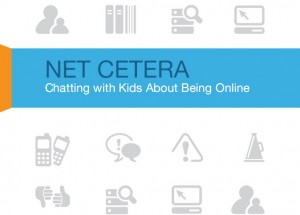FTC advice on talking with kids about online safetyFT

The FTC's excellent Internet safety booklet "Net Cetera"
The Federal Trade Commission has published an excellent guide for parents about helping kids and teens stay safe and protect their privacy and reputation online and on mobile devices. The booket covers sexting, cyberbullying, texting, computer security, parental controls and pre-teen privacy.
The free booklet, called Net Cetera: Chatting with Kids About Being Online,” is available free in printed form or as a downloadable and printable PDF (scroll down for link). You can also order free printed copies in English or Spanish.
Here is the beginning portion of the booklet with a link where you can continue reading.
Start early
After all, even toddlers see their parents use all kinds of devices. As soon as your child is using a computer, a cell phone or any mobile device, it’s time to talk to them about online behavior, safety, and security. As a parent, you have the opportunity to talk to your kid about what’s important before anyone else does.
An honest, open environment.
Kids look to their parents to help guide them. Be supportive and positive. Listening and taking their feelings into account helps keep conversation afloat. You may not have all the answers, and being honest about that can go a long way.
Initiate conversations.
Even if your kids are comfortable approaching you, don’t wait for them to start the conversation. Use everyday opportunities to talk to your kids about being online. For instance, a TV program featuring a teen online or using a cell phone can tee up a discussion about what to do—or not— in similar circumstances. News stories about internet scams or cyberbullying, for example, also can help start a conversation with kids about their experiences and your expectations. Even if your kids are comfortable approaching you, don’t wait for them to start the conversation. Use everyday opportunities to talk to your kids about being online. For instance, a TV program featuring a teen online or using a cell phone can tee up a discussion about what to do—or not— in similar circumstances. News stories about internet scams or cyberbullying, for example, also can help start a conversation with kids about their experiences and your expectations.
Communicate your values.
Be upfront about your values and how they apply in an online context. Communicating your values clearly can help your kids make smarter and more thoughtful decisions when they face tricky situations.
Be patient.
Resist the urge to rush through conversations with your kids. Most kids need to hear information repeated, in small doses, for it to sink in. If you keep talking with your kids, your patience and persistence will pay off in the long run. Work hard to keep the lines of communication open, even if you learn your kid has done something online you find inappropriate.
Read more & download the PDF from the FTC’s OnGuardOnline site

Leave a comment
You must be logged in to post a comment.